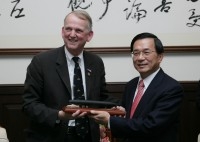President Chen Meets with U. S. Representative Robert R. Simmons

President Chen Shui-bian met with Representative Robert R. Simmons of the United States of America, expressing his warmest welcome on behalf of the country.
Representative Simmons personally received President Chen when the latter stopped over in New York in May 2001, and urged 33 representatives to write to Mr. Lien Chan, then chairman of the Kuomintang (KMT), to support Taiwan's arms procurement bill. Therefore, the president extended his deepest gratitude to Representative Simmons.
The president asserted that Taiwan is the best ally of the United States of America as far as democracy and regional security are concerned. In order to maintain stability in the Pacific region, Taiwan is fully responsible to prevent the balance of the military power from tipping to the other side of the Taiwan Strait. To achieve this, the president said that it was hoped that Taiwan's national defense budget would reach three percent of the country's gross domestic product (GDP) by the end of 2008. However, the president told the guest that the arms procurement bill had been blocked for the 46th time the day before in the Legislative Yuan. "National security should be assured in spite of political distinctions and the rotation of the government," said the president.
Speaking of his serious consideration to abolish the National Unification Council and its Guidelines, the president mentioned three points to the guest for further clarification: democracy, security, and the non-existence of the "92 Consensus".
As long as the existence of the National Unification Council and its Guidelines undoubtedly signify that unification is Taiwan's ultimate goal, the president first told the guest that it should be considered within a strictly spatial-temporal frame, that is, since Taiwan is a democratic country, the council and its guidelines would jeopardize the spirit of popular sovereignty to a great extend and deprive Taiwan's citizens of their ultimate choice regarding where to go. Secondly, the president told the guest he did not agree with the notion that the unification as the final goal would guarantee peace and stability between Taiwan and China. "Taiwan's national security in terms of sufficient self-defensive arms," the president emphasized, "is a key factor that maintains peace between the two sides and protects Taiwan's sovereignty from being endangered."
Lastly, but most importantly, the "92 Consensus does not exist," said the president. The president told the guest that after the Hong Kong Talks in 1992, the term, "One China, Two Interpretations," proposed by Taiwan at that time, was not being agreed upon. However, in August 2000, China unilaterally and audaciously used the term, "92 Consensus," arbitrarily rendering it as the conclusion of the Hong Kong Talks. The president said that, even in the pro-unification camp, there is no common definition of the term. "For China, the term refers to a unified body under the name of China; for the KMT, however, it refers to 'one China with two interpretations'," the president clarified. To show his objection, the president denounced the fact that "China's Communist Party and the KMT have lied together to the world for six year."
To conclude the meeting, the president, again, showed his respect and gratitude to Representative Simmons and invited him to visit Taiwan any time in the future.